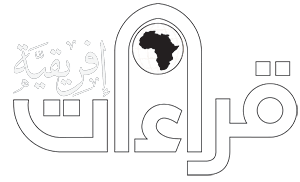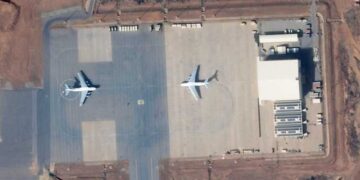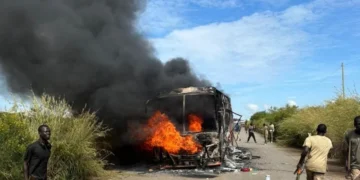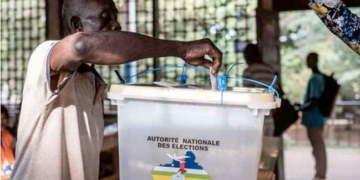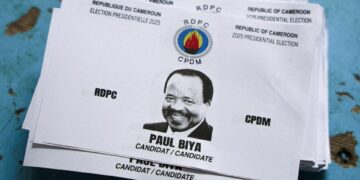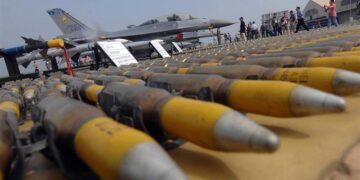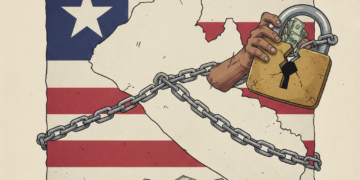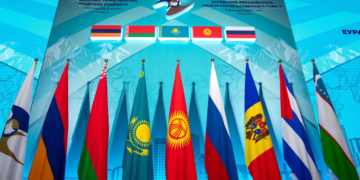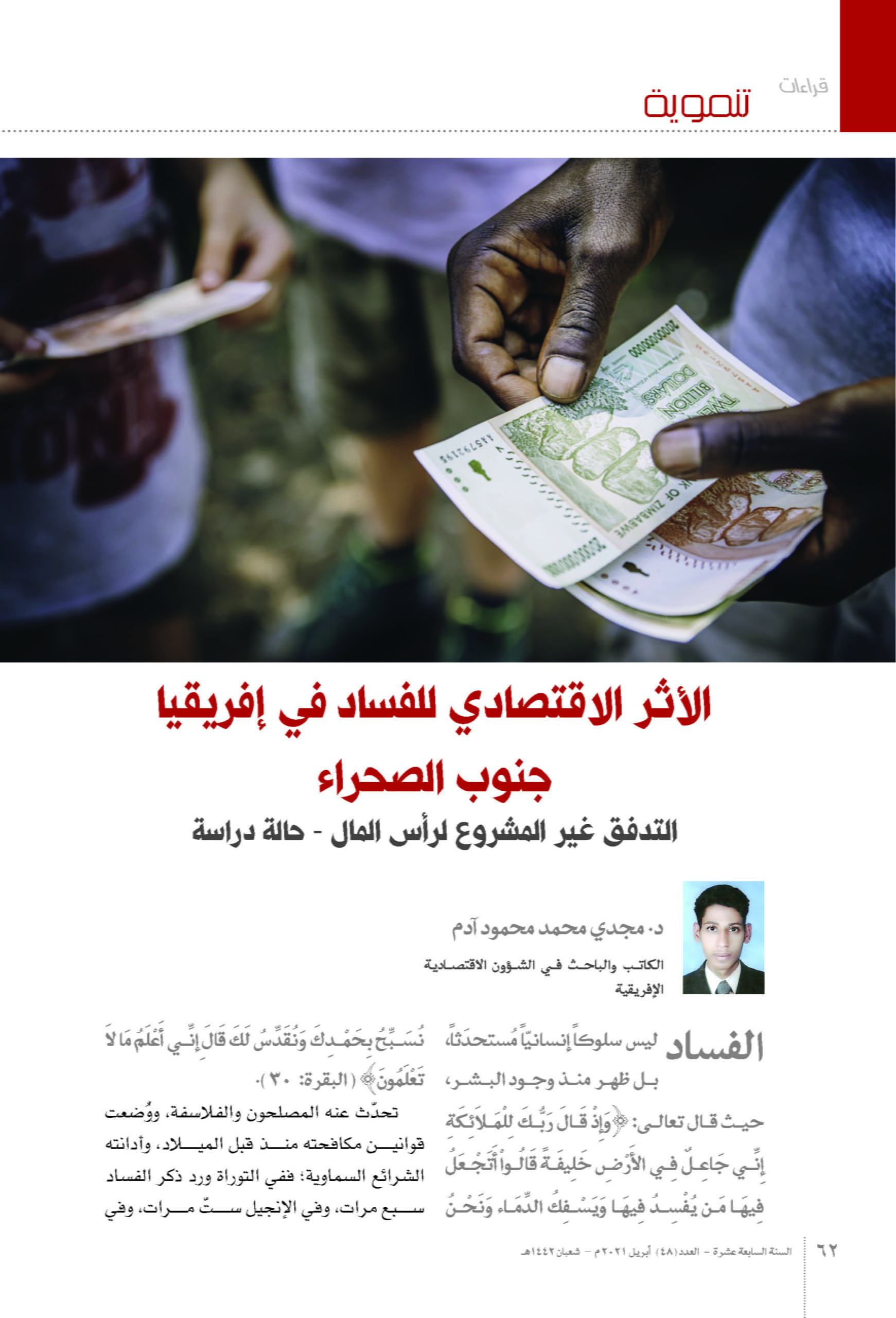Abstract: There is no doubt that corruption is an immoral, criminal phenomenon of many forms. It has negative effects on various walks of life. Illicit financial flows are one of its forms. Those flows that may be part of an illegal act or the product of an illegal work. Or used for an illegal purpose, to adversely affect economic development in several aspects. They arise in settings affected by conflict, poor in democracy, good governance, and the absence of regulatory institutions. Although estimates of illicit financial flows in Africa differ, at the lowest point they exceed tens of billions of dollars annually. According to some estimates, it is roughly equal to the volume of foreign aid and investment flowing into the continent. Its most prominent determinants were debt, political risks, corruption, conflicts, fraudulent billing and profit transfer, and trafficking in people, drugs and weapons. Illegal practices in the business operations of multinational companies explain more than half of those flows, followed by criminal activities, then bribery and embezzlement. These illegal flows in the African continent exert an annual increase higher than the global average, with a high degree of stability, to increase in wealth-rich countries affected by conflict, with their concentration in the region of the West, then the North, then the South, and with the increase in their flow abroad from the interior. Its behavior was also against the expectations of economic theory; As there was a positive relationship between the increase in economic growth rates in the African continent in the last two decades, and the growth rates of illicit financial flows. A waste of additional growth rates on African countries, which would have been achieved had these funds been invested locally. It would have been sufficient to fund the first ten-year plan for Agenda 2063. MPL caused an increase in the financial deficit on the continent. Most African countries have failed to fight corruption, especially those illicit financial flows, which reached its peak in the second decade of the twenty-first century, despite the fact that most countries on the African continent declared war on it, until a few African countries toped the Corruption Perceptions Index according to its recent publications. . This failure is due to weak or absent organizational structures, lack of funding, low technical capabilities, poor regional coordination, and the involvement of senior officials and international companies.
الملخص: لا شك أن الفساد ظاهرة إجرامية غير أخلاقية ،متعددة الأشكال. لها آثار سلبية على مختلف مناحي الحياة .تعتبر التدفقات المالية غير المشروعة إحدى أشكاله .تلك التدفقات التي قد تندرج في فعل غير قانوني.أو نتاج عمل غير مشروع. أو تستخدم لغرض غير قانوني.لتؤثر بشكل سلبي على التنمية الاقتصادية في جوانب عدة. تنشأ في البيئات المصابة بالنزاعات والفقيرة بالديمقراطية والحكم الرشيد وغياب المؤسسات الرقابية. وعلى الرغم من اختلاف تقديرات التدفقات المالية غير المشروعة في إفريقيا، إلا أنها تعدت في أدناها عشرات المليارات من الدولارات سنوياً. ووفقاً لبعض التقديرات تساوت تقريباً مع حجم المساعدات والاستثمارات الأجنبية المتدفقة إلى القارة. كانت أبرز محدداتها الديون، والمخاطر السياسة، والفساد، والصراعات، وعمليات تزييف الفواتير وتحويل الأرباح، وتجارة البشر والمخدرات والسلاح. لتفسر الممارسات غير القانونية في العمليات التجارية للشركات متعددة الجنسيات أكثر من نصف تلك التدفقات،تلتها الأنشطة الإجرامية ،ثم الرشوة والاختلاس . تمارس تلك التدفقات غير المشروعة في القارة الإفريقية زيادة سنوية أعلى من المعدل العالمي،مع درجة عالية من الثبات.لتزداد في الدول الغنية بالثروات والمتضررة من النزاعات.مع تركزها في إقليم الغرب ثم الشمال.ثم الجنوب.ومع تزايد تدفقها للخارج عن الداخل. كان سلوكها أيضاً مخالفاً لتوقعات النظرية الاقتصادية؛ حيث كانت هناك علاقة طردية بين زيادة معدلات النمو الاقتصادي في القارة الإفريقية في العقدين الأخيرين، ومعدلات النمو في التدفقات المالية غير المشروعة . مضيعة على الدول الإفريقية معدلات نمو إضافية، كانت تحققت لو تم استثمار تلك الأموال محلياً . ولكان كافياً لتمويل الخطة العشرية الأولى لأجندة ٢٠٦٣. مبل أحدثت ارتفاعاً في العجز المالي بالقارة. وقد فشلت غالبية الدول الإفريقية في مكافحة الفساد، وبالأخص تلك التدفقات المالية غير المشروعة .ذاك الذي بلغ ذروته في العقد الثاني من القرن الحادي والعشرين،على الرغم من إعلان غالبية دول القارة الإفريقية الحرب عليه،حتى تذيلت بضع دول افريقية مؤشر مدركات الفساد وفقاً لإصداراته الأخيرة . ويعود ذلك الفشل لضعف الهياكل التنظيمية أو غيابها، ونقص التمويل، وتدني القدرات التقنية، وسوء التنسيق الإقليمي، وتورط كبار المسئولين والشركات دولية النشاط.
